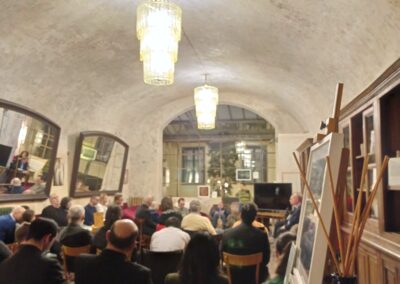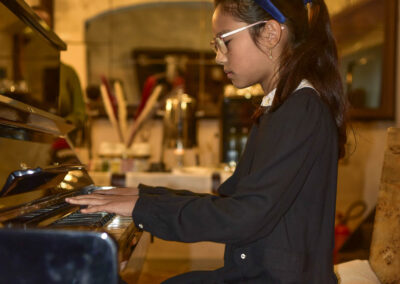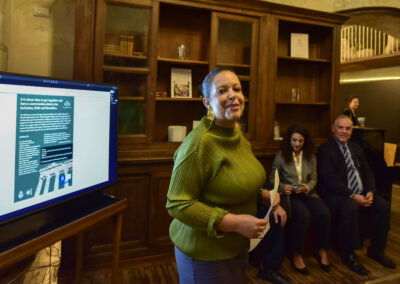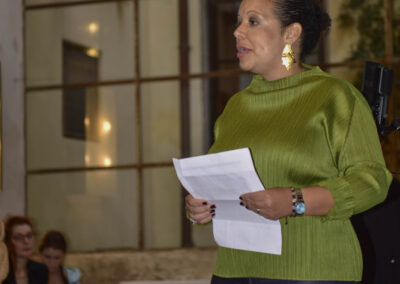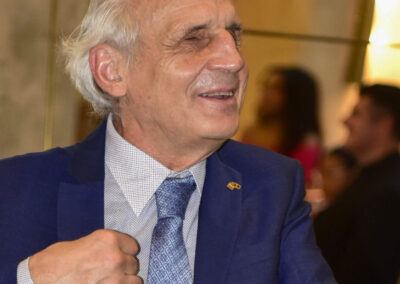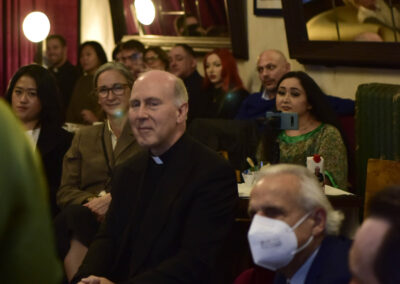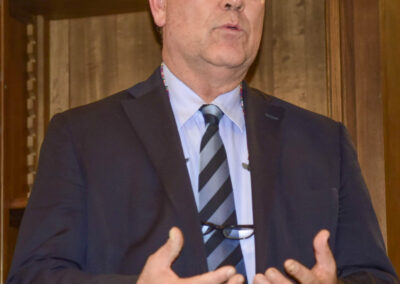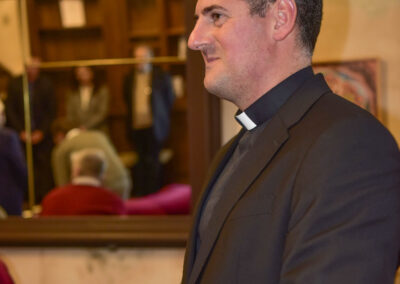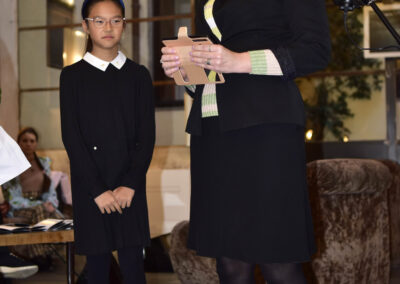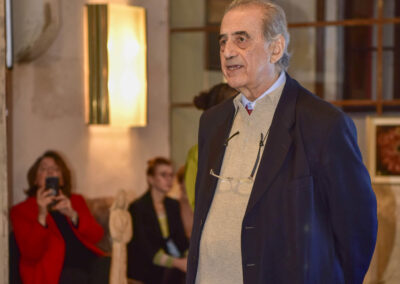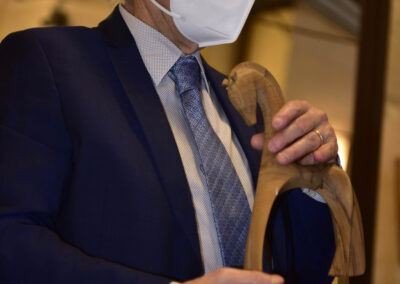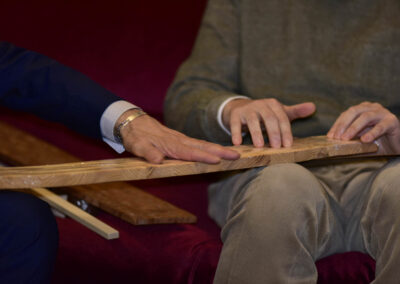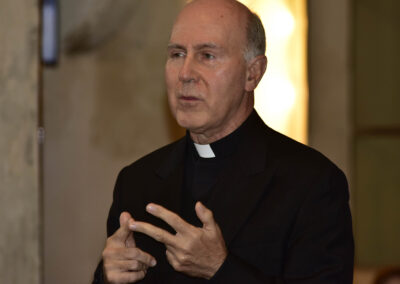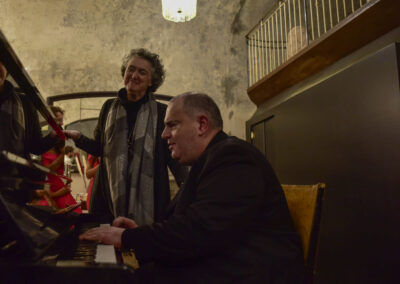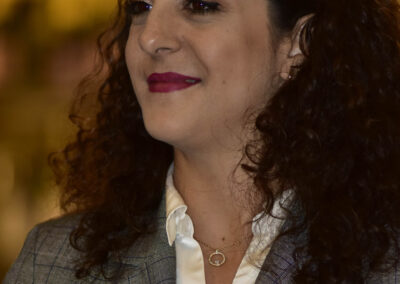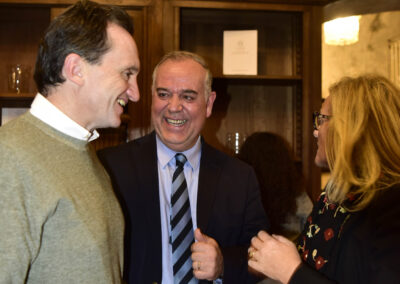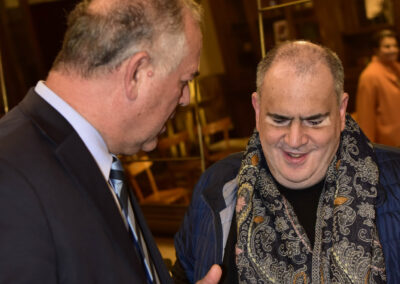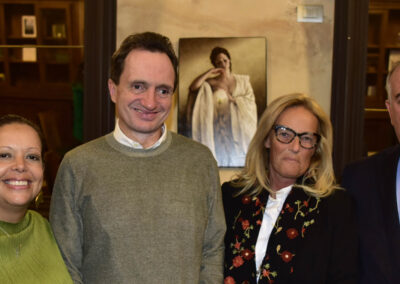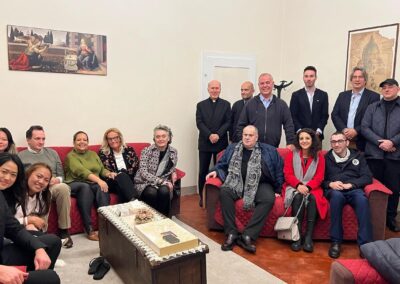Jul 24, 2023 | News
REMAPPING THE TERRITORY – VII Edition 2023-2024 – ONLINE
OBJECTIVES AND PROGRAM
August 2023 marks the 50th anniversary of the introduction – in the scientific arena – of the neologism “neuro-ethics” by Harvard neuropsychiatrist Anneliese Alma Pontius (1921-2018). Since 2009, thanks to the work of the Interdisciplinary Research Group in Neurobioethics (GdN) of the Faculty of Philosophy of the Pontifical Athenaeum Regina Apostolorum (APRA) in Rome, the term has acquired a personalist connotation.
After 15 years of research experience – and since 2017 having delved into the contexts of transhumanism, the so-called “head transplantation” in humans, robotics (roboethics), artificial intelligence (algor-ethics), neurotechnologies and current developments in virtual reality, augmented reality, and the Metaverse, from September 2023 to June 2024, the GDN will be offering a training course on neuroethics with the aim of critically “remapping” this interdisciplinary context of reflection on the neurosciences and their interpretations.
The Course also aims to raise the participants’ awareness about the relevance of neuroethical reflection in the multiple contemporary scenarios in which we live, move, and are. This 7th Advanced Training Course “Neurobioethics: remapping the territory” will offer a package of 10 seminars, round-table discussions, and the conference in March 2024 within the framework of the Brain Awareness Week promoted by the DANA Foundation, through which the historical genesis of the birth of neuroethics and the different paradigmatic models encountered today will be compared. Along the way, various areas of this reflection will be specifically presented: from the context of consciousness to neuroaesthetics, from neurolaw to sexual difference, and even including trans and posthuman backdrops.
The course will be in Italian and English and streamed online. Participants will be able to follow the course in synchronous and asynchronous modes.
Promoters:
Faculty of Philosophy
UNESCO Chair in Bioethics and Human Rights
Institute of Science and Faith
COURSE STRUCTURE
September 29, 2023 to 27-10-2023
The course consists of a monthly two-hour meeting (seminar or round-table), 5-7 p.m.
29/09: 17-19:00
27/10: 17-19:00
24/11: 17-19:00
15/12: 17-19:00
26/01: 17-19:00
23/02: 17-19:00
15/03: World Brain Week Conference
19/04: 17-19:00
24/05: 17-19:00
21/06: 17-19:00
The specific contents and speakers will be communicated month by month and will range from technological, neurological, neurosurgical, psychiatric, psychological, ethical, bioethical, legal and theological aspects related to the concept of “Metaverse”.
WHO SHOULD APPLY?
The program is aimed at all those who wish to learn more about neuroscience and its interpretations to better understand themselves, the advances, and risks. In particular, politicians, engineers, physicians, bioethicists, philosophers, theologians, teachers, and formators. At the end of the Course, participants will be awarded a certificate for the advanced course and 3 ECTS credits will be awarded after the evaluation of a written synthesis paper.
ACADEMIC FEE
350 euros by 29-09-2023
400 euros by 27-10-2023
Training Course Coordinator:
Prof. Fr. Alberto Carrara, L.C.
alberto.carrara@upra.org
For further information
Faculty of Philosophy
Renato Zeuli
E-mail: filosofia@upra.org
Tel.: +39 06 91689913
Jul 20, 2023 | News
By Analuisa Ahumada Madrigal, Student, Law School – Universidad Anahuac Queretaro
In Mexico there is a great problem with violence, connected to homicides. Mexico has registered around 91 deaths per day[1]; in the 7 entities which reported such statistics, it is said that 71% of the bodies are set to be unidentified[2]. However, there is an enormous problem concerning the dignity of unrecognized bodies, mainly because a dead person does not have the possibility of expressing wishes, purposes, suffering, or any type of resistance to the violence to which their body may be subjected[3]. In 2019 Mexico had a forensic crisis due to the war against drug trafficking during the six-year term of former President Felipe Calderon. The Forensic Medical Service (SEMEFO), registered the largest number of unidentified corpses ever seen. There were so many that no effort was even made to identify all of them. A study that was carried out on the forensic crisis found that 27,271 unrecognized bodies were taken to the “common grave”, 5,446 remain in SEMEFO and most impressively was that 2,589 bodies were donated to universities for experimentation[4]. Here is where the problem begins.
The law establishes that for the use of corpses of unknown persons, educational institutions may obtain them from establishments that provide medical care or social assistance services, but this becomes a problem for the dignity of the unidentified body, as well as causing violence to the family of the deceased person. Before death, the person did not consent to having his body donated to educational institutions where he could be subjected to experiments and various situations. In addition to that, his family will definitely no longer have the opportunity to find their relative. In Mexico, there is a “General Law of Victims” which establishes that victims have the right to know the truth and to receive specific information about crimes and violations of rights that had directly affected them[5]. If the corpse did not have post-mortem dignity, the law would not have to legislate against incorrect use of corpses. In the Mexican Federal Penal Code, it speaks about violations of rights in the privacy of the body, its image and its honor. In 2009 in Mexico, one of the largest cases of femicide – the campo algodonero case, which had occurred in 2001, was brought to the Inter-American Court of Human Rights. In this case 8 women were found dead, but only three were identified[6]. No effort was made to identify the other five bodies. The authorities dealt out the remaining bodies to the families with no assurance that they were actually members of those families. Another clear example of the lack of dignity accorded to unidentified bodies and the seriousness of donating unidentified corpses to educational institutions is that in 2014, Mexico once again suffered one of the most controversial cases it has ever seen, the disappearance of 43 students from Ayotzinapa, Guerrero.
Another very important issue that must be touched on is organ or tissue donation, whether a body is identified or not, it could be the victim of organ extractions for donation or sale. In Mexico this arises from a socio-cultural issue. Even despite having holidays like the Day of the Dead, death is not really something accepted and above all it may be felt to be terrifying. Organ donation can occur from brain death, which will include head trauma from a motor vehicle accident, falls, gunshot wounds, haemorrhages in the brain from aneurysms and seizures, drug overdose, drowning, and poisoning. among others[7]. Therefore, if the cause of death was a homicide by gunshot wound, people will be able to organ-poaching or illegally sell these organs. For such reasons, there is a brisk market in illegal organ sales on the part of organised crime in Mexico. Besides selling organs, these criminals go to extreme lengths to erase any link to the people that have been kidnapped and murder to obtain these organs. Sick people and their relatives do not readily accept death. This fear is often due to not knowing what happens after death, worry about surviving loved ones and the fact of not knowing if the process will be painful or not. I previously mentioned that a person is most vulnerable at the moment of death, since he can be the object of violence, modifications and extractions perpetrated on his body, and above all his last wishes regarding his body are not really fulfilled by the simple fact that he is no longer able to protest. Many people come to use the corpse as a mere object without that being the true desire of the person. Post-mortem dignity includes the times when the media take and use photos of the body and use them in publications, since they should not be exposed to the public. What we really need to consider is that even though the person has already died, their body still has dignity, and the family should be given respect and support. Finally, I believe that it is important to establish new regulations regarding unidentified bodies and, above all, to train the SEMEFO authorities so that they can have sufficient means to identify the massive number of bodies that need to be
[1] Deutsche Welle (www.dw.com). (n.d.). México registró menos homicidios en 2022. DW.COM. https://www.dw.com/es/m%C3%A9xico-registr%C3%B3-menos-homicidios-en-2022/a-64430440
[2] El Economista. (2022, December 1). En siete entidades, 71% de los cuerpos sin identificar. https://www.eleconomista.com.mx/politica/En-siete-entidades-71-de-los-cuerpos-sin-identificar-20221201-0004.html
[3] La Dignidad Post-Mortem en el Sistema Jurídico Mexicano. (2022). Comisión Estatal De Derechos Humanos Jalisco. Retrieved March 26, 2023, from https://cedhj.org.mx/revista%20DF%20Debate/articulos/revista_No18/ADEBATE-18-art2.pdf
[4] Tzuc, E. (2020, September 25). Crisis forense en México: un país rebasado por sus muertos. CIPER Chile. https://www.ciperchile.cl/2020/09/25/crisis-forense-en-mexico-un-pais-rebasado-por-sus-muertos/
[5] Ley general de víctimas. (2013, January 9). https://www.diputados.gob.mx/LeyesBiblio/pdf/LGV.pdf. Retrieved July 9, 2023, from https://www.diputados.gob.mx/LeyesBiblio/pdf/LGV.pdf
[6] “Campo Algodonero”: Caso González y otras vs. México | Comisión Nacional de los Derechos Humanos – México. (n.d.). https://www.cndh.org.mx/noticia/campo-algodonero-caso-gonzalez-y-otras-vs-mexico
[7] Muerte Cerebral. (2021). The National Kidney Foundation. Retrieved March 26, 2023, from https://www.kidney.org/sites/default/files/docs/braindeath_sp.pdf
Mar 10, 2023 | Bioethics and Human Ecology, News
Brescia Port of Worlds. Culture Narrates Migrations.
On Feb. 23, 24 and 25, the UNESCO Chair of the University of Brescia’s “Training and Strengthening Human Resources for Health Development in Resource-limited Countries,” in collaboration with the Italian Network of Italian UNESCO Chairs and the CARME Cultural Association, on the occasion of Brescia Bergamo Italian Capital of Culture 2023, organized an event titled “Brescia Port of Worlds. Culture Narrates Migrations.”
The event took place in the Carmine neighborhood, the cradle of more than 145 different nationalities, a symbol of the migration and integration phenomenon in the city of Brescia. Specifically, the event occurred within the C.A.R.M.E. Centro Arti Multiculturali ed Etnosociali, a place that fosters dialogue and social and cultural aggregation. On the initiative of citizens to enhance the former church of Saints Philip and James, CARME lends itself as a workshop, discussion forum and gallery for temporary exhibitions. In this multicultural context, the forum for discussion on the multiple aspects of the migration phenomenon and integration models was held with a focus on Brescia bringing the community closer to speeches and testimonies of experts, professionals and representatives through presentations, round tables and cultural, musical and film performances.
Some representatives of Italian UNESCO Chairs, including our Chair of Bioethics and Human Rights represented by Serena Montefusco, shared their experiences and projects in line with the 2030 Agenda and UNESCO principles on migration. In fact, as stated in the Concept Note, UNESCO pays particular interest to the phenomenon of migration and its implications, in order to understand the links between migration and education and the challenges posed by intercultural education, student mobility and international recognition of qualifications. The organization also addresses the social dimensions of climate change and migration, particularly with regard to governance, conflict, human rights and international law, gender equality, economic and human development and public health.
In light of these principles, interesting interventions aimed at developing the education and skills of migrants and refugees welcomed to the European Union emerged. After the video greetings of the CNIU Secretary General, Enrico Vicenti, the proceedings were opened by the President of the University of Brescia, Prof. Francesco Castelli also Chairholder of the Chair “Training and Reinforcement of Human Resources for Health Development in Resource Limited Countries” who spoke in-depth about the various types of migrants and on the theory of pull and push factors. Then Prof. Raimondo Cagiano de Azevedo of the UNESCO Chair Population, Migrations and Development, Sapienza University of Rome, spoke summarizing the development challenges and opportunities for migrants both in the country of origin and destination. Continuing, Professors Domenico Simeone and Diego Mesa of the UNESCO Chair Education for Human Development and Solidarity among Peoples, Università Cattolica del Sacro Cuore, presented a phenomenon, which is constantly growing, concerning the reception of unaccompanied foreign minors. After a short break, the proceedings resumed with speeches by other representatives of UNESCO Chairs including Antonio Guerci, UNESCO Chair Anthropology of Health. Biosphere and Healing Systems, University of Genoa; Massimo Zortea, UNESCO Chair Engineering for Human and Sustainable Development, University of Trento; Paola Raffa and Natalina Carrà, UNESCO Chair Mediterranean Landscapes in Context of Emergency, University of Reggio Calabria; Serena Montefusco, UNESCO Chair in Bioethics and Human Rights Chair, Pontifical Athenaeum Regina Apostolorum and European University of Rome; Annateresa Rondinella, UNESCO Sustainable Energy Communities Chair, University of Pisa and UNESCO Chair On Futures of Education for Sustainability, Pontifical Lateran University; Giovanna Marconi and Solomon Elala Seyoum, UNESCO Chair on Social and Spatial Inclusion of International Migrants, Urban Policies and Practices, Iuav University of Venice.
Serena Montefusco shared the activities carried out within the Bioethics and Human Ecology area of interest, specifically the implementation of projects supported by EU funds i.e. EUROSOL and CivicAL, but also an event presenting the Global Compact on migrants and refugees and the Role and Impact of the Church. With the release of the Encyclical Laudato Sì, the Chair has created a research group to explore the topic of the environment, biosphere and biodiversity. Human ecology means that the ecological issue is an ethical issue concerning human actions. In addressing diverse and pressing environmental issues, it is important to safeguard the centrality of the human person and his dignity. Sustainable development implies that the progress of society must be accompanied by the integral development of the whole person, including his or her physical, psychosocial, cultural and spiritual-moral dimensions. The right to the integral development of the whole person entails the duty to accommodate and provide the means to move from a state of social vulnerability to a state of dignified life (see Art. 3 SDGs) through good education (see Art. 4 SDGs) and the continued work of governments and societies for peace and justice (see Art. 16 SDGs). The responsibility, in fact, lies not only with all governments, but all members of society have responsibilities regarding the promotion and realization of this right to migration, including individuals, families, local communities, nongovernmental organizations, and civil society organizations.
Annateresa Rondinella, shared with the audience the UNESCO Passport to Qualifications for Vulnerable Refugees and Migrants. UNESCO, in the field of Education, established The UNESCO Passport for the Qualifications of Vulnerable Refugees and Migrants drawing on the experiences and methodology of the European Qualifications Passport (EQPR) initiative in an initiative sponsored by the Norwegian Agency for Quality Assurance in Education (NOKUT) in collaboration with the Council of Europe. Based on the Lisbon Convention adopted on November 14, 2017 in Strasbourg, the UNESCO Qualifications Passport for Refugees is a standardized statement that contains three parts: the assessment part, the explanatory part, and the third part about the way forward. It differs from the European Qualifications Passport for Refugees, which consists of two parts: the assessment part and the explanatory part. Although this document does not constitute formal recognition or authorization or entitlement to practice a particular profession, it summarizes and presents the information available based on the applicant’s level of education, work experience and language skills. The assessment methodology is defined by the combination of an evaluation of available documentation, and the use of structured interview. Thus, the document provides credible information that may be relevant to applications for jobs, internships, qualifying courses, admission to studies. An early example of UQP recognition is right at the University of Brescia.
Another example of mobility, thanks to UNHCR-promoted university corridors, was shared directly by Solomon Seyoum Elala of the Iuav University of Venice. Introduced by Giovanna Marconi, Solomon told the students and participants in the room about his experience starting in Ethiopia and ending in Venice. Despite initial difficulties in adapting due to the cultural context and language limitations, Solomon continues his studies in engineering with the goal of bringing all the practical knowledge he has acquired back to his home country.
The first day ended with a concert by Coleur d’Afrique and a multi-ethnic aperitif organized by the CiboxTutti association. The second day’s work included two panel discussions: the first, “Integration and Equity: Common Good,” Franco Valenti, IDOS Lombardy Referent, Roberto Cammarata, Brescia City Council, Camilla Bianchi, Provincial Coordination of Local Authorities for Peace and International Cooperation, Roberto Memme, LDA Association in Zavidovici, and Roberto Zini, Industrial Association of Brescia. The second: “Places of encounter and dialogue” Alessandro Sipolo, Independent Researcher, Don Roberto Ferranti, Office for Migrants and Interreligious Dialogue of the Diocese of Brescia Omar Ajam, Islamic Cultural Center and Giulio Vita, La Guarimba.
The comparison is inevitable between the Carmine neighborhood of Brescia and the Torpignattara neighborhood of Rome, where the Agenzia Scalabriniana per la Cooperazione allo Sviluppo operates within the project Casa Scalabrini 634, with which we have collaborated on various projects in the field of migration and human rights. The UNESCO Chair in Bioethics and Human Rights, for more than a decade, has aimed to create forums of diverse bioethical thought leaders to promote interfaith dialogue and human rights by collaborating in a spirit of respect and friendship, providing a common framework to guide the application of bioethical principles in light of the UNESCO Declaration (2005). In this way, we can inform and illuminate ethical, legal, and public opinions, decisions, and actions related to medicine, life sciences, and human rights and responsibilities.
Read the Italian version.
Nov 21, 2022 | Bioethics Global Art
By Serena Montefusco, UNESCO Chair in Bioethics and Human Rights
Upon the initiative of Dr Renata Santos Beman, who has been involved in raising awareness of the rights of the blind and visually impaired people for more than ten years, a meeting, or as the organizer called it, “A Conversation” on the topics of art, inclusion, faith and bioethics was held last Nov. 12 at Florence’s Palazzo San Niccolò, a vintage and welcoming venue from the 14th century.
“This small event is an opportunity to embrace our humanity to meet new people, create friendships and enjoy each other, as, through time, a good conversation has always been a crucial starting point towards hope. The idea is to challenge ourselves and our imagination on how we see the world and what we can do to transform it into a more inclusive place through arts, education, bioethics, or simple everyday conversations” – Dr Renata Santos Beman.
In an almost old-fashioned atmosphere, there were present The President of the Italian Union of the Blind and Visually Impaired & Florence Territorial Section, Dr Niccolò Zeppi, Professor Emeritus Luca Uzielli, Lecturer Emeritus in Wood Technology at the University of Florence, sculptor Andrea Bianco, pianist and writer Duccio Lamberti, Professor and Director of the Science and Faith Institute of the Pontifical Athenaeum Regina Apostolorum, Fr. Rafael Pascual, LC, and Prof. Alberto García Gómez, Dean of the Faculty of Bioethics and Director of the UNESCO Chair in Bioethics and Human Rights (Pontifical Athenaeum Regina Apostolorum and the European University of Rome).
After the opening greetings, a blessing by Fr. Daniel Mauricio, LC, followed by Dr Santos Beman’s reflection on her experience supporting the blind and other vulnerable groups, and how getting to know the reality of many blind and visually impaired, in particular, shifted her career. It contributed to her interdisciplinary ways of conducting research in the fields of science of behavior inspired by the work of BF Skinner towards arts, education, and the experience of faith, as seen in her recent work on meanings of relics beyond vision and the experience of vulnerability and the Shroud of Turin. Dr Santos Beman discussed that is still much more that can be done towards equity and social inclusion. Then, Dr Zeppi shared his experiences, as a blind person, as President of the Italian Union of the Blind and Visually Impaired in supporting and promoting autonomy, education, research and rehabilitation. Professor Natalia Parenko representing The International Saint Petersburg Art Academy in Firenze, introduced the piano performance by a talented young pianist Angela Chen with an outstanding performance that symbolized the start of the Conversation with the hope in the young generations.
Next, Prof. Uzielli presented some wood sculptures and plates highlighting how, through sight, touch and smell, it is possible to explore and learn about the world of wood. Interestingly, one of the participants, Prof. Paolo Pecile, that emphasized the importance of wood’s versatile properties through time for the development of society and technology; above all, he made a point of reflecting on the fact that history is told to us through the Iron Age, for example, and not “the age of the wood.”
After a moment of pause, Fr. Rafael Pascual, LC, introduced interdisciplinary perspectives in religion, mainly through studying the Shroud of Turin and how it has inspired many artists, including Mr Andrea Bianco. At the Regina Apostolorum Pontifical Athenaeum in Rome, Fr. Rafael Pascual, LC, in addition to coordinating the Master of Science and Faith, the Diploma in Shroud Studies, curates the Permanent Exhibition on the Holy Shroud – Who is the Man of the Shroud? The exhibition is a collection of images, objects, and sculptures that allow visitors to have a spiritual, historical and scientific experience where the mysteries of the sacred cloth where the figure of a man’s body with apparent signs of torture is imprinted are revealed.
The latest sculpture, “Ecce Homo according to the Shroud,” donated by Andrea Bianco himself on the occasion of the 15th Anniversary of the opening of the exhibition, is modelled on the Shroud’s Face. “There were numerous and dramatic details to be made on that Face. Starting with a swollen eye like a boxer’s, continuing with the stroke of the stick along the cheek, then that strip of torn beard and the trickle of blood on the forehead. But the most heinous thing for me was the helmet of thorns. At this point, I realized in fullness that the purpose was not to create a beautiful work, but rather a sculpture that would represent, as much as possible, the unspeakable pain of our God for the salvation of sinners.”- Mr. Andrea Bianco.
As we approach the end of this conversation among friends, M.B Dallocchio, an artist and social worker from Beverley Hills now living in Florence, introduced the born blind pianist Duccio Limberti that has an incredible history of achievements, graduated in languages in 1987, at the Martini Conservatory in Bologna he obtained the certificate of theory and solfeggio. Self-taught musician, arranger, singer, improviser author of 2 books. Duccio played national and international hits also accompanied by his wife, Lali Burduli, with whom he creates the LALIMBERTI Duo. The performance left everyone excited and with goosebumps, then Duccio Limberti and Prof. García (with the guitar) together improvised a Spanish piece, then leaving the floor to Prof. García to share the UNESCO Chair in Bioethics and Human Rights Bioethics and Global Art project, which through the different expressions of art wants to promote inclusion in respect of human rights and the importance of vulnerability in bioethics, as well as the arts as a form of education in the universal values and principles of the Universal Declaration Of Bioethics and Human Rights (2005). To conclude, Dr. Serena Montefusco Project Manager and Communication Officer of the UNESCO Chair, invited the participants to an aesthetic experience by showing some works from the International Bioethics and Art Competition that the UNESCO Chair realized as an expression of the project.
The conversation ended in the general enthusiasm of all participants who were able to appreciate the magic of meeting and sharing with each other, the magic of the presence of the Spirit that made it all possible.
Oct 3, 2022 | News
We are honored to share with all fellows, researchers, collaborators, benefactors and friends of the UNESCO Chair in Bioethics and Human Rights that the renewal of the Chair has been approved until July 2026.
“We are confident that the Chair will continue to bring added value to UNESCO’s strategic priorities in the field of bioethics and human rights through research, documentation, training, knowledge sharing and inter-university cooperation in the Global South.” Sobhi Tawil (PhD), Director, Future of Learning and Innovation

